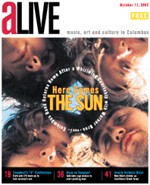Back In Black
Before their closely timed deaths, Johnny Cash and June Carter Cash amassed enough amazing stories to fill several movies. It’s mostly fortunate that in his film version of Cash’s early life and his love story with June, director and co-writer James Mangold doesn’t feel the need to embellish. Except for a bit of compressing and timeline juggling, he and co-writer Gill Dennis remain faithful in spirit and fact to the couple and their music (they participated in the project while still alive), but Mangold could’ve brought a little more life of his own to the retelling.
Walk the Line is a textbook example of a celebrity biopic, if such a textbook exists, starting at a pivotal, positive moment in the performer’s life and following the Behind the Music trajectory of struggle, stardom, temptation and redemption, with the required montage of images dissolving into each other under music to project passing of time and pre-end credit title cards explaining the main characters’ ultimate Earthly fates.
From a brief stop in 1968, where Joaquin Phoenix’s Cash is between songs at Folsom Prison, the story goes back to the defining moments of his childhood: His older brother Jack’s death in a gruesome power saw accident and Johnny’s farming, drinking father (Robert Patrick) telling him that the wrong son died.
As a young man, Johnny does a stint in the military, gets married for the first time and unsuccessfully tries the straight life before he’s discovered by the rock producer Sam Phillips. Constantly on the road afterwards, Johnny’s given speed by another musician to keep up the pace, and the demons from Johnny’s childhood are joined by a monkey on his back.
Along on the tour is June Carter Cash (Reese Witherspoon). She and Johnny begin a friendship that lasts through addiction, drinking, womanizing, many wrecked hotel rooms and a combined total of three failed marriages before he convinces her to marry him.
Phoenix clearly puts a lot of heart and a lot of effort into his performance. His labor is palpable in the beginning, where Witherspoon seems more effortless in her portrayal, but Phoenix’s load does seem lighter when she’s around, which jibes well with the actual couple’s dynamic.
In characterization and in their singing styles (both perform their own songs, and Witherspoon in particular has a hell of a voice), the stars wisely go for the flavor of the Cashes over full-on mimicry. They more than pass muster on final judgment; this may even be the role to earn Witherspoon her first Oscar nod.
The story moves along smoothly and engagingly, populated by a few standout supporting players like Sandra Ellis Lafferty as Mother Maybelle Carter and Tyler Hilton as Elvis, but something is lacking. These are extraordinary figures, and while Mangold is a competent filmmaker, he isn’t extraordinary. The hallucinations Cash experienced while flying and crashing on speed (chronicled in the autobiographies cited as the film’s source) alone provide great material for a memorable break from formula, a renegade flourish befitting the man who wrote “Cocaine Blues” as well as “Cry, Cry, Cry.” But while Cash was the sort to give the country music industry the finger in the pages of Billboard, Mangold toes the line.


